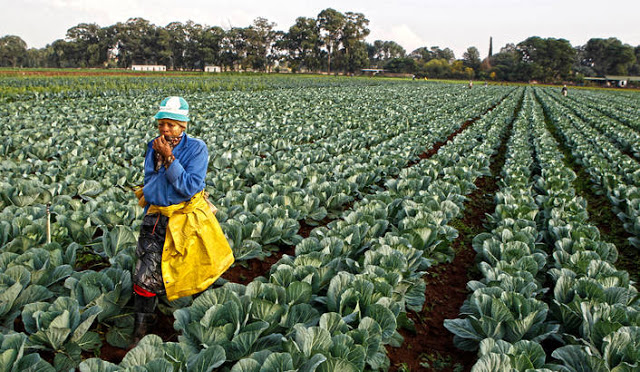The plan by South Africa’s ruling African
National Congress (ANC ) to change the constitution to make it easier
to take land without paying for it has added to emerging-market jitters
in knocking the country’s assets.
National Congress (ANC ) to change the constitution to make it easier
to take land without paying for it has added to emerging-market jitters
in knocking the country’s assets.
A plan to expropriate land without
compensation will benefit a small number of citizens if successfully
implemented but will be disastrous for most people if it goes awry, one
of SA’s leading research institutions warned.
compensation will benefit a small number of citizens if successfully
implemented but will be disastrous for most people if it goes awry, one
of SA’s leading research institutions warned.
While the party sees expropriation
without payment as a way to speed up redressing racially skewed
ownership patterns dating back to the colonial and apartheid eras,
critics say that it could erode property rights and lead to
Zimbabwe-style land grabs.
without payment as a way to speed up redressing racially skewed
ownership patterns dating back to the colonial and apartheid eras,
critics say that it could erode property rights and lead to
Zimbabwe-style land grabs.
“If we get land reform right, we make a
couple of thousand people rich and we can have some impact on the
livelihoods of others,” Terence Corrigan, a researcher at the SA
Institute of Race Relations, said.
couple of thousand people rich and we can have some impact on the
livelihoods of others,” Terence Corrigan, a researcher at the SA
Institute of Race Relations, said.
“If we get it wrong, we lose agricultural exports and damage the balance of payments.
“If you kick the legs out from under
agriculture, we don’t get foreign exchange and we struggle to import.
There is a massive risk of doing land reform badly and a modest prospect
of doing it well,” he said.
agriculture, we don’t get foreign exchange and we struggle to import.
There is a massive risk of doing land reform badly and a modest prospect
of doing it well,” he said.
SA’s farmers are among the world’s
biggest white-maize, table-grape and citrus-fruit exporters, and are the
second-largest producers of a wool variety used in clothing.
biggest white-maize, table-grape and citrus-fruit exporters, and are the
second-largest producers of a wool variety used in clothing.
A 2017 state-commissioned land audit
shows that a third of the country’s rural land is owned by individuals
and 72% of that is in white hands.
shows that a third of the country’s rural land is owned by individuals
and 72% of that is in white hands.
Companies and trusts hold 43% of rural land, and the race of their beneficiaries and owners is difficult to determine.
With a general election looming in 2019,
President Cyril Ramaphosa has embraced expropriation without
compensation but insists there will not be a land grab.
President Cyril Ramaphosa has embraced expropriation without
compensation but insists there will not be a land grab.
The EFF, which has won support from young voters in impoverished townships, supports the change and wants all land nationalized.
Individual farmers, some of them with
good political connections, could be the biggest beneficiaries of land
redistribution, according to Corrigan.
good political connections, could be the biggest beneficiaries of land
redistribution, according to Corrigan.
Of SA’s land area of 122- million hectares, 94-million hectares is used for agriculture.
The state owns as much as 22% of the country, while millions of hectares are controlled by traditional rulers.
Several million mostly poor black citizens own houses for which they often do not have title deeds, according to the institute.
A parliamentary committee is considering possible amendments to the constitution to facilitate expropriation.
Opinion polls commissioned by the
89-year-old think-tank from 2015 to 2017 show “the great majority of
black South Africans have little interest in land reform”, the institute
said in a written submission to the panel. “This is
not surprising, as the country is already 65% urbanised and most people
want jobs and houses in the towns and cities.”
89-year-old think-tank from 2015 to 2017 show “the great majority of
black South Africans have little interest in land reform”, the institute
said in a written submission to the panel. “This is
not surprising, as the country is already 65% urbanised and most people
want jobs and houses in the towns and cities.”
Of the 76,000 land claims submitted from
1994 — when white-minority rule ended — until 1998, the applicants opted
for cash compensation in 92% of instances, it said, citing former land
and rural development minister Gugile Nkwinti.
1994 — when white-minority rule ended — until 1998, the applicants opted
for cash compensation in 92% of instances, it said, citing former land
and rural development minister Gugile Nkwinti.
Under SA’s current system, ownership of
land bought for redistribution is generally retained by the state and
emerging black farmers are only eligible to purchase these farms after
working them for 50 years, the institute said.
land bought for redistribution is generally retained by the state and
emerging black farmers are only eligible to purchase these farms after
working them for 50 years, the institute said.
Those farmers “generally lack title to
the land they work”, it said. “They cannot use this land as collateral
and battle to raise working capital. They are also reluctant to put up
fences or otherwise invest in their land because
their leases can be terminated any time.”
the land they work”, it said. “They cannot use this land as collateral
and battle to raise working capital. They are also reluctant to put up
fences or otherwise invest in their land because
their leases can be terminated any time.”





